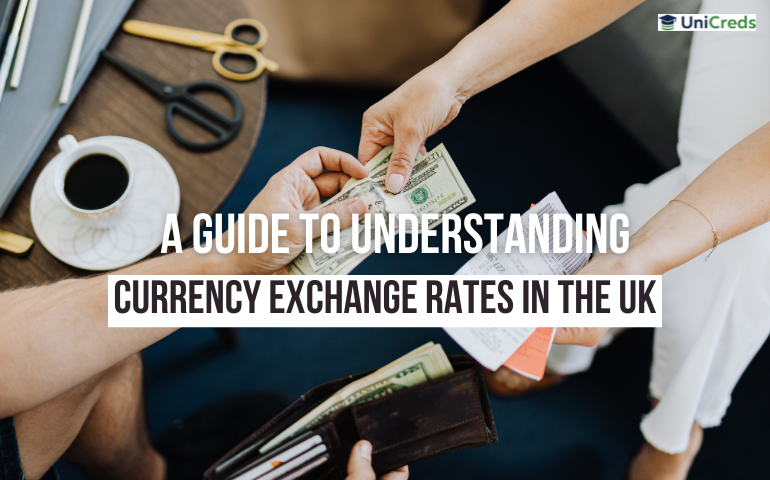Table of Contents
Arriving in the UK as an international student is an exciting milestone, but understanding how to manage your money is just as important as your academic journey.
Currency exchange rates in the UK can significantly affect your budget, from tuition payments to daily expenses.
This guide will help you navigate the essentials of exchanging currency, saving money, and making informed decisions, so you can focus on your studies and new adventures.
The British Pound Sterling: What Every Student Should Know

The British Pound Sterling (GBP), often called the pound (£), is the UK’s official currency and has been in use since the 17th century.
One pound is divided into 100 pence. You’ll use coins (1p, 2p, 5p, 10p, 20p, 50p, £1, £2) and notes (£5, £10, £20, £50) in everyday transactions.
Why Currency Exchange Rates In The UK Matter For Students?
Currency exchange rates in the UK determine how much your home currency is worth in pounds. Even a small shift in rates can impact your tuition, rent, and living expenses. For example, if you’re paying £10,000 in tuition, a 2% change in the rate could mean a difference of hundreds in your home currency.
Key Point: Always monitor exchange rates before making large transfers or payments to maximise your funds.
Factors Influencing Currency Exchange Rates In The UK
Interest Rates and Bank of England Policy
When the Bank of England raises interest rates, it attracts more foreign investment, boosting demand for the GBP and strengthening the currency.
Lower rates, however, often lead investors to move money elsewhere, which can weaken the pound.
UK’s Economic Health
GDP growth, employment levels, and business performance shape how strong or weak the pound feels globally. A growing, stable economy builds investor confidence and supports a stronger GBP. Slower growth or rising unemployment usually does the opposite.
Inflation Rates
Low inflation preserves the pound’s purchasing power and signals economic control, making the currency more attractive to foreign investors. High inflation, on the other hand, weakens its value and may deter investment.
Curious about how currency exchange impacts your study abroad plans?
Get ahead with financial support! Apply for an abroad education loan and manage your expenses with ease while studying in the UK.
Political Climate and Policy Certainty
The more stable the UK’s political environment, the stronger the pound. Political uncertainty, like elections, policy changes, or global negotiations, can shake investor confidence and lead to currency dips.
Trade Balance and Foreign Investment
A strong export economy and steady capital inflows boost demand for the pound. But when the UK imports more than it exports or sees major investment outflows, the currency tends to slide.
Global Events and Risk Sentiment
Geopolitical tensions, global crises, or shifting investor sentiment can sway the value of the GBP. Sometimes the pound is seen as a safe bet; other times, external shocks cause it to weaken—depending on how the UK is positioned globally.
Commodity Price Movements
The UK relies on imported energy. Rising oil or commodity prices increase business costs, strain the economy, and can weaken the GBP. Lower global prices often ease pressure and support the pound’s strength.
Monetary Moves by Other Central Banks
Currency values are relative. When other central banks (like the US Fed or ECB) change interest rates or policy direction, the balance shifts. If the UK’s policies diverge sharply, the pound could either gain or lose ground against those currencies.
Practical Example: How Exchange Rates Affect Your Budget
(Suppose your tuition is £15,000. If the exchange rate is 1 GBP = 105 INR, you’ll need 1,575,000 INR. If the rate shifts to 1 GBP = 108 INR, you’ll need 1,620,000 INR—a difference of 45,000 INR just from a small rate change. This could cover several weeks of groceries or a month’s rent.)
Essential Tips To Exchange Currency For Students and Travellers
Before You Leave Home
- Contact Your Local Bank: Local banks often offer better rates and lower fees than airport kiosks. Ask about student-friendly services and consider exchanging a small amount before you travel.
- Avoid Airport Exchanges: Airport counters are convenient but have some of the worst rates and highest fees, sometimes up to 15% more than banks or online platforms.
After Arrival in the UK
- ATMs: Withdrawing cash from UK ATMs using your international card is convenient, but check for foreign transactions and ATM fees.
- Currency Exchange Bureaux: Found in city centres, these offer varying rates. Compare options and avoid tourist hotspots for better deals.
- Online Platforms: Services like Wise and Revolut provide transparent, real-time rates and low fees for international transfers and spending.

How to Get the Best Currency Exchange Rates In The UK?
1. Open a Multi-Currency or Student Bank Account
Some UK banks offer accounts tailored for international students. These accounts allow you to hold multiple currencies and convert when rates are favourable. This can help you avoid multiple conversion fees and protect against currency fluctuations.
2. Use the 70/30 Rule
Load about 70% of your funds onto a prepaid forex or travel card and carry the remaining 30% in cash. This approach balances convenience and safety, forex cards lock in exchange rates at loading, reduce foreign transaction fees, and are widely accepted across ATMs and merchants, while cash is handy for small purchases or places that don’t accept cards.
Forex cards also offer security features like PIN protection and easy blocking if lost or stolen. This mix is instrumental during your initial weeks abroad when you are still settling in and may face unpredictable spending needs.
3. Time Your Transfers
Keep an eye on currency exchange rates and transfer larger sums when rates are favourable to get more value for your money. Use online platforms that offer real-time rate alerts and tools to monitor fluctuations.
While there is no universally guaranteed “best time,” mid-month transfers often avoid peak bank activity and fee hikes, and weekends or Mondays may have less market volatility. Even small rate improvements can save significant amounts for large transfers, so patience and vigilance pay off.
4. Avoid High-Fee Locations
Airport kiosks, tourist hotspots, and city-centre exchange offices typically offer poor exchange rates and charge higher fees. Instead, use reputable banks, authorised forex bureaus, or online platforms that provide transparent rates and lower fees.
Also, consider withdrawing larger amounts at once from partner ATMs to minimise multiple ATM charges. Paying in the local currency rather than your home currency also avoids costly dynamic currency conversion fees.
5. Compare Providers
Always compare exchange rates and fees from multiple sources, such as banks, online money transfer services, forex bureaus, and fintech platforms like Revolut or Wise. Some providers charge hidden fees or offer less competitive rates despite advertising low upfront costs.
6. Use Specialist Currency Exchange Services
Consider using specialist currency exchange companies like Travelex, Eurochange, or Currency Online Group, which often provide better rates than high street banks. These providers typically have lower fees and more competitive exchange rates, especially if you order currency online for home delivery or branch collection. Always check their live rates and fees before committing.
7. Withdraw Cash from Local ATMs
Using ATMs in the UK to withdraw cash in GBP can often yield better exchange rates than currency exchange counters. However, choose ATMs linked to major banks to avoid excessive withdrawal fees, and use a travel card or debit card that reimburses ATM fees or charges low foreign transaction fees.
8. Consider Mobile Payment Options
Mobile wallets like Apple Pay, Google Pay, or Samsung Pay are increasingly accepted in the UK and can be a convenient, secure way to pay without carrying cash. Linking your travel or student card to these wallets can help you avoid foreign transaction fees and simplify spending.
9. Use Online Currency Comparison Tools
Before exchanging money or transferring funds, use online comparison websites such as Money.co.uk or Wise’s rate comparison tool to find the best live exchange rates and fee structures. This helps you avoid hidden costs and ensures you get the most value for your money.
10. Lock in Rates with Forward Contracts (for Large Transfers)
If you plan to transfer a large sum, consider using a currency forward contract through specialist providers. This allows you to lock in a favourable exchange rate for up to two years, protecting you from adverse currency fluctuations.
11. Opt for Fee-Free or Low-Fee Bank Accounts
Some UK banks, like NatWest or Lloyds, offer fee-free currency exchange for their customers, though the exchange rate margin may still apply. If you’re a student, check if your bank provides special accounts with waived foreign transaction fees and competitive rates.
12. Plan Currency Needs in Advance
Avoid last-minute currency exchanges, which often come with higher fees. Planning your currency requirements ahead of time lets you monitor rates and exchange when the market is favourable, saving you money in the long run.
13. Use Prepaid Multi-Currency Travel Cards
Prepaid travel cards allow you to load multiple currencies at locked-in rates before travelling. This helps you budget better and avoid fluctuating exchange rates while abroad. Cards from providers like Wise, Revolut, or Credila ISIC ForexPlus offer additional perks such as insurance and easy reloads.
7 Essential Tips For Managing Finances As A Student

Common Currency Exchange Mistakes to Avoid
- Exchanging at Airports: Airport exchange counters are convenient but usually offer poor exchange rates and high fees, which can cost you significantly more than other options. It’s best to avoid exchanging large amounts of money at airports.
- Ignoring Fees: Always check for hidden charges such as service fees, commissions, and ATM withdrawal costs. These can quickly add up and reduce the amount you actually receive or spend.
- Not Comparing Rates: Exchange rates vary widely between banks, bureaux, and online platforms. Taking the time to compare rates can save you a substantial amount, especially on large transfers or tuition payments.
- Overusing International Cards: Using credit cards for everyday purchases can lead to high foreign transaction fees. It’s better to use credit cards for large purchases and debit cards or prepaid travel cards for ATM withdrawals and daily spending to minimise fees.
- Delays in Transfers: Some traditional banks take several days to process international transfers, which can cause stress if funds are needed urgently. Opt for services known for faster transfer times to avoid delays.
- Lack of Transparency: Some providers hide fees in poor exchange rates or add unexpected charges. Choose services that clearly show all fees and offer real-time tracking of your transfers.
- Not Researching Banking Options: Many students struggle with UK banking requirements like proof of address. Digital banks such as Monzo or Starling offer easier account opening processes without traditional address proofs, which can save time and hassle.
- Failing to Plan for Currency Fluctuations: Exchange rates can change daily. Setting up rate alerts and planning transfers when rates are favourable can protect your budget from unexpected losses.
Managing your finances wisely while studying abroad is crucial to making the most of your time in the UK.
A forex card offers a secure, cost-effective way to handle your expenses, protect against fraudulent currency exchange rates in the UK, and avoid hidden fees.
With the right tools and guidance, you can focus on your studies and enjoy your international experience without financial stress.
Simplify your study abroad finances with UniCreds. Get tailored support for education loans and assistance on taking the first step. Start your journey with confidence today!
FAQs
1. Where should I exchange currency in the UK?
Avoid airports and hotels due to poor rates and high fees. Instead, use reputable foreign exchange bureaus like Travelex, Eurochange, or Currency Online Group, or withdraw cash from major bank ATMs for better rates.
2. What is the currency exchange rate in the UK?
Exchange rates vary daily and include a margin above the mid-market rate; always check live rates on trusted currency converters before exchanging to avoid overpaying.
3. Is it necessary to have an international student bank account in the UK to exchange currency?
Not strictly necessary, but opening a UK student bank account can simplify managing funds, reduce fees, and facilitate easier currency conversions at favourable rates.
4. Can I exchange currency in the UK online?
Yes, many providers like Travelex and Currency Online Group offer online ordering and home delivery or branch collection, often with better rates and no commission fees.
5. Is there any hidden charge for currency exchange in the UK?
While some bureaus claim no commission, they usually include a profit margin in the exchange rate. Always compare rates and beware of dynamic currency conversion fees when using ATMs or card payments.










0 Comments